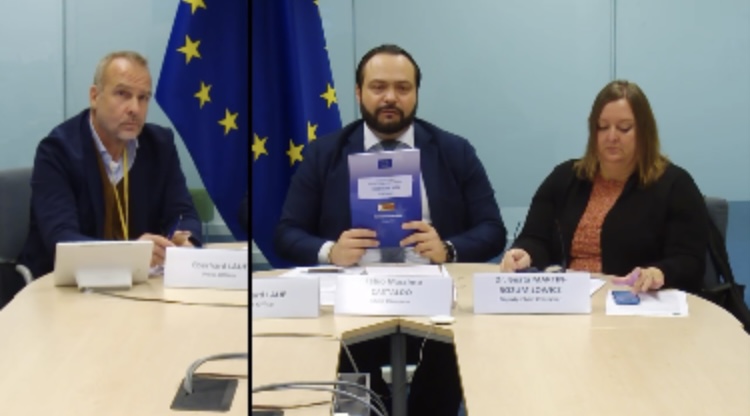The European Union Election Observation Mission (EU EOM) has issued its final report on Zimbabwe’s 2023 Harmonised Elections, concluding that the elections fell short of regional and international standards due to significant curtailments of political rights throughout the campaign period.
The report highlights the detrimental impact of intimidation and the Zimbabwe Electoral Commission’s (ZEC) perceived political bias on the overall fairness of the elections.
EU EOM Chief Observer Fabio Massimo Castaldo presented this final report online from Brussels, the administrative centre of the European Union (EU) on Friday, noting that while the mission was supposed to return to Zimbabwe, as is standard practice to present the report, the Zimbabwean government did not show political will to allow it to do so.
“Our observations were carried out in two months, before, during, and after the Election Day, whose final report contains a set of recommendations for future electoral processes. It is now up to Zimbabweans to take ownership of their implementation,” Castaldo said, highlighting the EU EOM found it “shocking and unprecedented” how ZEC refused to meet the mission despite repeated requests.
According to Castaldo, Zimbabwe’s overall electoral process contained concerns on fundamental rights and lacked a level playing field that was worsened by intimidation, confirming the EU mission observed first hand cases of intimidation by members of the Forever Associate Zimbabwe (FAZ).
“While Election Day was largely calm, it was assessed as disorderly. The late opening of hundreds of polling stations descending into the next day seriously impeded some citizens’ right to vote. The delays were most pronounced in Bulawayo, Harare and in Manicaland appeared to have disproportionately affected some opposition strongholds,” Castaldo said.
However, the chief observer stated it was not their job, nor their commitment to give any certification of elections, or say whether the election were free or fair or not, because their job was “to follow, and observe all the different faces of the process and then to say if they comply or they do not comply with the regional and international standards.”
In Zimbabwe’s case, the EU EOM head stated that as they had “reiterated many times during their preliminary statement and even today, several cases fell short” and “were not exactly complying with the regional and international standards.”
“It was essentially so because many rights were curtailed during the campaign, even during the election itself,” Castaldo said.
The EU EOM provided 21 recommendations, listing seven as priority which the mission said may bring comprehensive and meaningful electoral reforms.
“This especially relates to the right of association, to express freely, not related to by bureaucratic barriers such as the undue nomination fees. This is critical to bring legislation in line with the regional and international farmers. It would be necessary that the Zimbabwean authorities saw the political will to engage in these reforms, to lay the ground for genuine and credible elections in the future,” he said.
Castaldo recommended that measures have to be taken to make sure ZEC and its staff are able to operate without political influence at all levels, including in their appointment mechanism and by removing governmental approval of its relations.”
“Further, the EU EOM recommends that ZEC provides timely and comprehensive information on all the aspects of the preparations and its regulations, and publishes timely election results disaggregated by polling station,” he said.
The independence of the judiciary was another recommendation, where authorities review the appointment procedure of judges and apply real separation of powers.
The Chief Observer also confirmed that the mission faced significant challenges to meet with official bodies at the national level despite repeated requests, citing ZEC as a stakeholder who only met the mission once and “unfortunately was equally unavailable for meetings with him, members of the European Parliament delegation and other colleagues yet other observer organisations were granted repeated access several times.”
Calstado described such behaviour as unprecedented in his long time as a politician, parliamentarian and election observer.
“This is something that really surprised me and shocked me at the same time. This lack of meaningful access was coupled with an extensive, coordinated and continued disinformation campaign against the EU EOM and other international observations on the part of some national media,” he said.
The Chief Observer said reporting by the state media on the EU EOM was based on lies and violated any journalistic standards, noting it could have endangered the safety of their observers on the ground.
Also concerning, according to Calstado, was how the government did not respond any time to this disinformation campaign, despite its commitment in the administrative arrangement to ensure the personal safety of all the members of the EU EOM.
The Chief Observer said while the EU EOM cannot comment on any level of events after its departure, they were notified of alleged politically motivated abductions and even torture.
“These reports include the recent murder of opposition activists. I strongly and firmly condemn any violence that has occurred. There is no space for retribution for harassment, torture and murder in a democratic society,” Castaldo said and encouraged the authorities to bring the perpetrators swiftly to justice against the background on how these elections were conducted.


Leave a comment